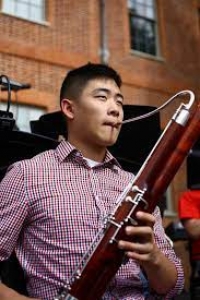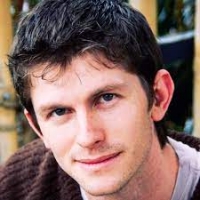Violin Sheet Music
 "It's the opportunity to play something completely different, responding to what happened just before you started to play, and I love that." Larry Carlton - Jazz influenced guitar player
"It's the opportunity to play something completely different, responding to what happened just before you started to play, and I love that." Larry Carlton - Jazz influenced guitar player
Traditional

traditional music
Alejandro García Caturla
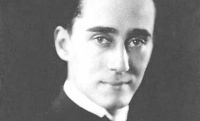
Alejandro García Caturla (7 March 1906 – 12 November 1940) was a Cuban composer of art music and creolized Cuban themes.Caturla was born in the town Remedios (Villa Clara, Cuba). With only sixteen years old, in 1922, he won a position as part of the section of the 2nd violins of the newly formed “Orquesta Sinfónica de La Habana”, where Amadeo Roldán was the concertmaster. He started to write music since he was a teenager, while studying both music and law. He felt attracted to Afro-Cuban rhythms since he was really young, and this became a common denominator in his compositions in a time when the division between art music and popular music did not influence Cuban composers. From 1925 to 1927 he continued his musical studies in Paris as a student of Nadia Boulanger.
Sergey Rahmaninov
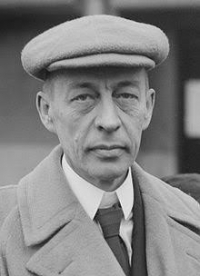
Sergei Vasilievich Rachmaninoff, Russian composer, conductor, pianist. He is one of the greatest pianists and composers of the 20th century. He was the last great composer of Russian romanticism. After the October Revolution in his country, he settled in the USA and became a US citizen
Koen Dejonghe
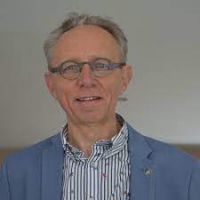
Koen Dejonghe has held a position at the conservatory in Antwerp since 1986, teaching practical harmony and improvisation. He currently also gives classes in accompaniment, instrumental ensemble performance and harmony and counterpoint at the music academies of Sint-Niklaas and Antwerp.
Schubert

Franz Peter Schubert (January 31, 1797 – November 19, 1828) was an Austrian composer. He wrote some 600 lieder, nine symphonies (including the famous "Unfinished Symphony"), liturgical music, operas, and a large body of chamber and solo piano music. He is particularly noted for his original melodic and harmonic writing.
While Schubert had a close circle of friends and associates who admired his work (including his teacher Antonio Salieri, and the prominent singer Johann Michael Vogl), wider appreciation of his music during his lifetime was limited at best. He was never able to secure adequate permanent employment, and for most of his career he relied on the support of friends and family. Interest in Schubert's work increased dramatically in the decades following his death and he is now widely considered to be one of the greatest composers in the Western tradition.
While he was clearly influenced by the Classical sonata forms of Beethoven and Mozart (his early works, among them notably the 5th Symphony, are particularly Mozartean), his formal structures and his developments tend to give the impression more of melodic development than of harmonic drama. This combination of Classical form and long-breathed Romantic melody sometimes lends them a discursive style: his 9th Symphony was described by Robert Schumann as running to "heavenly lengths". His harmonic innovations include movements in which the first section ends in the key of the subdominant rather than the dominant (as in the last movement of the Trout Quintet). Schubert's practice here was a forerunner of the common Romantic technique of relaxing, rather than raising, tension in the middle of a movement, with final resolution postponed to the very end.
While Schubert had a close circle of friends and associates who admired his work (including his teacher Antonio Salieri, and the prominent singer Johann Michael Vogl), wider appreciation of his music during his lifetime was limited at best. He was never able to secure adequate permanent employment, and for most of his career he relied on the support of friends and family. Interest in Schubert's work increased dramatically in the decades following his death and he is now widely considered to be one of the greatest composers in the Western tradition.
While he was clearly influenced by the Classical sonata forms of Beethoven and Mozart (his early works, among them notably the 5th Symphony, are particularly Mozartean), his formal structures and his developments tend to give the impression more of melodic development than of harmonic drama. This combination of Classical form and long-breathed Romantic melody sometimes lends them a discursive style: his 9th Symphony was described by Robert Schumann as running to "heavenly lengths". His harmonic innovations include movements in which the first section ends in the key of the subdominant rather than the dominant (as in the last movement of the Trout Quintet). Schubert's practice here was a forerunner of the common Romantic technique of relaxing, rather than raising, tension in the middle of a movement, with final resolution postponed to the very end.
Bond Quartet

Together Tania Davis (Violin), Eos Counsell (violin), Elspeth Hanson (viola) and Gay-Yee Westerhoff (cello) complete the line-up of BOND.
At its launch, BOND was hailed in the press as ‘the Spice Girls of Classical music’, and went onto turn the world of classical crossover music on its head, spawning many electric string groups inspired by its unique sound.
The members of BOND draw their inspiration from classical, latin, folk, jazz, rock, pop, electro, Indian and middle eastern styles. They have built a very active and loyal international fan base over the years and, since their debut, BOND have sold over 4 million albums worldwide, making BOND the best-selling string quartet of all time.
At its launch, BOND was hailed in the press as ‘the Spice Girls of Classical music’, and went onto turn the world of classical crossover music on its head, spawning many electric string groups inspired by its unique sound.
The members of BOND draw their inspiration from classical, latin, folk, jazz, rock, pop, electro, Indian and middle eastern styles. They have built a very active and loyal international fan base over the years and, since their debut, BOND have sold over 4 million albums worldwide, making BOND the best-selling string quartet of all time.
Apocalyptica

Apocalyptica is a Finnish cello metal band, composed of classically trained cellists and, since 2005, a drummer. Three of the cellists are graduates of the Sibelius Academy in Helsinki, Finland. Their music features elements from classical music, neo-classical metal, thrash metal, and symphonic metal.
Tchaikovsky

Pyotr Il'yich Tchaikovsky (May 7 1840 â November 6 1893) was a Russian composer of the Romantic era. While not part of the nationalistic music group known as "The Five", Tchaikovsky wrote music which, in the opinion of Harold Schonberg, was distinctly Russian: plangent, introspective, with modally-inflected melody and harmony.
Aesthetically, Tchaikovsky remained open to all aspects of Saint Petersburg musical life. He was impressed by Serov and Balakirev as well as the classical values upheld by the conservatory. Both the progressive and conservative camps in Russian music at the time attempted to win him over. Tchaikovsky charted his compositional course between these two factions, retaining his individuality as a composer as well as his Russian identity. In this he was influenced by the ideals of his teacher Nikolai Rubinstein and Nikolai's brother Anton.
Tchaikovsky's musical cosmopolitanism led him to be favored by many Russian music-lovers over the "Russian" harmonies and styles of Mussorgsky, Borodin and Rimsky-Korsakov.
Nonetheless he frequently adapted Russian traditional melodies and dance forms in his music, which enhanced his success in his home country. The success in St. Petersburg at the premiere of his Third Orchestral Suite may have been due in large part to his concluding the work with a polonaise. He also used a polonaise for the final movement of his Third Symphony.
Aesthetically, Tchaikovsky remained open to all aspects of Saint Petersburg musical life. He was impressed by Serov and Balakirev as well as the classical values upheld by the conservatory. Both the progressive and conservative camps in Russian music at the time attempted to win him over. Tchaikovsky charted his compositional course between these two factions, retaining his individuality as a composer as well as his Russian identity. In this he was influenced by the ideals of his teacher Nikolai Rubinstein and Nikolai's brother Anton.
Tchaikovsky's musical cosmopolitanism led him to be favored by many Russian music-lovers over the "Russian" harmonies and styles of Mussorgsky, Borodin and Rimsky-Korsakov.
Nonetheless he frequently adapted Russian traditional melodies and dance forms in his music, which enhanced his success in his home country. The success in St. Petersburg at the premiere of his Third Orchestral Suite may have been due in large part to his concluding the work with a polonaise. He also used a polonaise for the final movement of his Third Symphony.
Hubert Parry
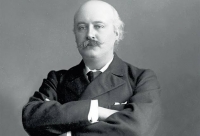
Sir Charles Hubert Hastings Parry, 1st Baronet was an English composer, teacher and historian of music. Parry's first major works appeared in 1880
Bach

Johann Sebastian Bach (31 March 1685 – 28 July 1750) was a German composer and organist whose sacred and secular works for choir, orchestra, and solo instruments drew together the strands of the Baroque period and brought it to its ultimate maturity. Although he introduced no new forms, he enriched the prevailing German style with a robust contrapuntal technique, an unrivalled control of harmonic and motivic organisation in composition for diverse musical forces, and the adaptation of rhythms and textures from abroad, particularly Italy and France.
Revered for their intellectual depth and technical and artistic beauty, Bach's works include the Brandenburg concertos; the Goldberg Variations; the English Suites, French Suites, Partitas, and Well-Tempered Clavier; the Mass in B Minor; the St. Matthew Passion; the St. John Passion; The Musical Offering; The Art of Fugue; the Sonatas and Partitas for violin solo; the Cello Suites; more than 200 surviving cantatas; and a similar number of organ works, including the celebrated Toccata and Fugue in D Minor.
While Bach's fame as an organist was great during his lifetime, he was not particularly well-known as a composer. His adherence to Baroque forms and contrapuntal style was considered "old-fashioned" by his contemporaries, especially late in his career when the musical fashion tended towards Rococo and later Classical styles. A revival of interest and performances of his music began early in the 19th century, and he is now widely considered to be one of the greatest composers in the Western tradition.
Revered for their intellectual depth and technical and artistic beauty, Bach's works include the Brandenburg concertos; the Goldberg Variations; the English Suites, French Suites, Partitas, and Well-Tempered Clavier; the Mass in B Minor; the St. Matthew Passion; the St. John Passion; The Musical Offering; The Art of Fugue; the Sonatas and Partitas for violin solo; the Cello Suites; more than 200 surviving cantatas; and a similar number of organ works, including the celebrated Toccata and Fugue in D Minor.
While Bach's fame as an organist was great during his lifetime, he was not particularly well-known as a composer. His adherence to Baroque forms and contrapuntal style was considered "old-fashioned" by his contemporaries, especially late in his career when the musical fashion tended towards Rococo and later Classical styles. A revival of interest and performances of his music began early in the 19th century, and he is now widely considered to be one of the greatest composers in the Western tradition.
Haydn

Franz Joseph Haydn (March 31, 1732 – May 31, 1809) was one of the most prominent composers of the classical period, and is called by some the "Father of the Symphony" and "Father of the String Quartet".
A life-long resident of Austria, Haydn spent most of his career as a court musician for the wealthy Hungarian Esterházy family on their remote estate. Isolated from other composers and trends in music until the later part of his long life, he was, as he put it, "forced to become original".
Although Haydn is still often called "Franz Joseph Haydn", the composer did not use the name "Franz" during his lifetime and this misnomer is avoided by modern scholars and historians. Joseph Haydn was the brother of Michael Haydn, himself a highly regarded composer, and Johann Evangelist Haydn, a tenor.
A central characteristic of Haydn's music is the development of larger structures out of very short, simple musical motifs, often derived from standard accompanying figures. The music is often quite formally concentrated, and the important musical events of a movement can unfold rather quickly.
Haydn's work was central to the development of what came to be called sonata form. His practice, however, differed in some ways from that of Mozart and Beethoven, his younger contemporaries who likewise excelled in this form of composition. Haydn was particularly fond of the so-called "monothematic exposition", in which the music that establishes the dominant key is similar or identical to the opening theme. Haydn also differs from Mozart and Beethoven in his recapitulation sections, where he often rearranges the order of themes compared to the exposition and uses extensive thematic development.
Perhaps more than any other composer's, Haydn's music is known for its humour. The most famous example is the sudden loud chord in the slow movement of his "Surprise" symphony; Haydn's many other musical jokes include numerous false endings (e.g., in the quartets Op. 33 No. 2 and Op. 50 No. 3), and the remarkable rhythmic illusion placed in the trio section of the third movement of Op. 50 No. 1.
A life-long resident of Austria, Haydn spent most of his career as a court musician for the wealthy Hungarian Esterházy family on their remote estate. Isolated from other composers and trends in music until the later part of his long life, he was, as he put it, "forced to become original".
Although Haydn is still often called "Franz Joseph Haydn", the composer did not use the name "Franz" during his lifetime and this misnomer is avoided by modern scholars and historians. Joseph Haydn was the brother of Michael Haydn, himself a highly regarded composer, and Johann Evangelist Haydn, a tenor.
A central characteristic of Haydn's music is the development of larger structures out of very short, simple musical motifs, often derived from standard accompanying figures. The music is often quite formally concentrated, and the important musical events of a movement can unfold rather quickly.
Haydn's work was central to the development of what came to be called sonata form. His practice, however, differed in some ways from that of Mozart and Beethoven, his younger contemporaries who likewise excelled in this form of composition. Haydn was particularly fond of the so-called "monothematic exposition", in which the music that establishes the dominant key is similar or identical to the opening theme. Haydn also differs from Mozart and Beethoven in his recapitulation sections, where he often rearranges the order of themes compared to the exposition and uses extensive thematic development.
Perhaps more than any other composer's, Haydn's music is known for its humour. The most famous example is the sudden loud chord in the slow movement of his "Surprise" symphony; Haydn's many other musical jokes include numerous false endings (e.g., in the quartets Op. 33 No. 2 and Op. 50 No. 3), and the remarkable rhythmic illusion placed in the trio section of the third movement of Op. 50 No. 1.
Nicola Piovani
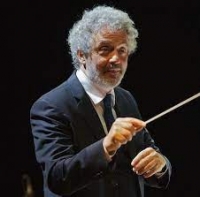
Nicola Piovani (born 26 May 1946) is an Italian light-classical musician, theater and film score composer, and winner of the 1999 Best Original Dramatic Score Oscar for the score of the Roberto Benigni film La Vita è bella, better known to English-speaking audiences as Life Is Beautiful.After high school, Piovani enrolled at the Sapienza University of Rome, receiving his degree in piano from the Verdi Conservatory in Milan in 1967, and later studied orchestration under the Greek composer Manos Hadjidakis.Among his more popular works is the score for the Federico Fellini film Intervista, his second of three collaborations with the famous director, the others being Ginger e Fred (Ginger and Fred in English) and La voce della luna (The Voice of the Moon). Years later, he composed a ballet titled Balletto Fellini.
Emil Hartmann
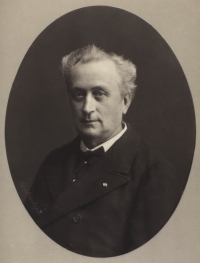
Emil Hartmann (1 February 1836, Denmark – 18 July 1898, Copenhagen, Denmark) was a Danish composer, fourth generation of composers in the Danish Hartmann musical family. He had three sons, Johannes Palmer Hartmann (1870-1948) who established a large horticulture in Ghent, specialised in palm trees, Rudolph Puggaard Hartmann (1871-1958), engineer, and Oluf Hartmann (1879-1910), a renowned painter, as well as two daughters, Bodil Neergaard (1867-1959), a philanthropist and patron of the arts, and Agnete Lehmann (1868-1902), actress at the Royal Theatre in Copenhagen, and wife of Julius Lehmann (1861-1931), theatre and opera instructor.
Bela Bartok

Béla Viktor János Bartók (pronounced /ˈbɑrtɒk/ (Wells 1990), Hungarian pronunciation: ) (March 25, 1881 – September 26, 1945) was a Hungarian composer and pianist. He is considered to be one of the greatest composers of the 20th century and is regarded, along with Liszt, as his country's greatest composer (Gillies 2001). Through his collection and analytical study of folk music, he was one of the founders of ethnomusicology.
Music theory

Music theory is the study of the practices and possibilities of music. The Oxford Companion to Music describes three interrelated uses of the term "music theory"
Henri Betti
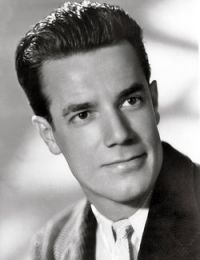
Henri Betti, born Ange Betti (24 July 1917 – 7 July 2005), was a French composer and a pianist.Pianist and composer of Maurice Chevalier from 1940 to 1945, Henri Betti is best known for composing the music of the songs C'est si bon (lyrics by André Hornez), What Can I Do ? (lyrics by Édith Piaf) and The Windmill Song (lyrics by Jacques Plante) that were performed by Yves Montand.
Bon Jovi
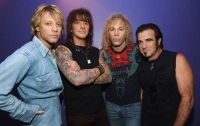
Bon Jovi is a rock band from Sayreville, New Jersey. Fronted by lead singer and namesake Jon Bongiovi, the group originally achieved large-scale success in the 1980s. Over the past 25 years, Bon Jovi has sold over 120 million albums worldwide, including 34 million in the United States alone.
Bon Jovi formed in 1983 with lead singer Jon Bon Jovi, guitarist Richie Sambora, keyboardist David Bryan, bassist Alec John Such, and drummer Tico Torres. Other than the departure of Alec John Such in 1994 (which pared the lineup down to a quartet), the lineup has remained the same for the past 25 years. After two moderately successful albums in 1984 and 1985, the band scored big with Slippery When Wet (1986) and New Jersey (1988), which sold a combined 19 million copies in the U.S. alone, charted eight Top Ten hits (including four number one hits), and launched the band into global super stardom. After non-stop touring, the band went on hiatus after the New Jersey Tour in 1990, during which time Jon Bon Jovi and Richie Sambora both released successful solo albums. In 1992, the band returned with the double platinum Keep the Faith and has since created a string of platinum albums throughout the 1990s and 2000s.
In 2006, the band won a Grammy for best Country Collaboration for "Who Says You Can't Go Home" with Jennifer Nettles from Sugarland and also became the first rock band to reach #1 on the Hot Country Songs chart with the same song. The band has also received multiple Grammy nominations for music from the albums Crush, Bounce, and Lost Highway.
Throughout their career, the band has released ten studio albums, of which nine have gone platinum. In addition, the band has charted 19 singles to the Top 40 of the Billboard Hot 100, four of which reached #1 ("You Give Love a Bad Name", "Livin' on a Prayer", "Bad Medicine", and "I'll Be There for You"). The band also holds the record for the most weeks for a hard rock album at #1 on the Billboard 200 with Slippery When Wet, as well as the most Top 10 singles from a hard rock album, with New Jersey, which charted five such singles.
Bon Jovi formed in 1983 with lead singer Jon Bon Jovi, guitarist Richie Sambora, keyboardist David Bryan, bassist Alec John Such, and drummer Tico Torres. Other than the departure of Alec John Such in 1994 (which pared the lineup down to a quartet), the lineup has remained the same for the past 25 years. After two moderately successful albums in 1984 and 1985, the band scored big with Slippery When Wet (1986) and New Jersey (1988), which sold a combined 19 million copies in the U.S. alone, charted eight Top Ten hits (including four number one hits), and launched the band into global super stardom. After non-stop touring, the band went on hiatus after the New Jersey Tour in 1990, during which time Jon Bon Jovi and Richie Sambora both released successful solo albums. In 1992, the band returned with the double platinum Keep the Faith and has since created a string of platinum albums throughout the 1990s and 2000s.
In 2006, the band won a Grammy for best Country Collaboration for "Who Says You Can't Go Home" with Jennifer Nettles from Sugarland and also became the first rock band to reach #1 on the Hot Country Songs chart with the same song. The band has also received multiple Grammy nominations for music from the albums Crush, Bounce, and Lost Highway.
Throughout their career, the band has released ten studio albums, of which nine have gone platinum. In addition, the band has charted 19 singles to the Top 40 of the Billboard Hot 100, four of which reached #1 ("You Give Love a Bad Name", "Livin' on a Prayer", "Bad Medicine", and "I'll Be There for You"). The band also holds the record for the most weeks for a hard rock album at #1 on the Billboard 200 with Slippery When Wet, as well as the most Top 10 singles from a hard rock album, with New Jersey, which charted five such singles.
Brahms

Johannes Brahms (May 7, 1833 â April 3, 1897) was a German composer of the Romantic period. He was born in Hamburg and in his later years he settled in Vienna, Austria.
Brahms maintained a Classical sense of form and order in his works â in contrast to the opulence of the music of many of his contemporaries. Thus many admirers (though not necessarily Brahms himself) saw him as the champion of traditional forms and "pure music," as opposed to the New German embrace of program music.
Brahms venerated Beethoven: in the composer's home, a marble bust of Beethoven looked down on the spot where he composed, and some passages in his works are reminiscent of Beethoven's style. The main theme of the finale of Brahms's First Symphony is reminiscent of the main theme of the finale of Beethoven's Ninth, and when this resemblance was pointed out to Brahms he replied that any ass â jeder Esel â could see that.
Ein deutsches Requiem was partially inspired by his mother's death in 1865, but also incorporates material from a Symphony he started in 1854, but abandoned following Schumann's suicide attempt. He once wrote that the Requiem "belonged to Schumann". The first movement of this abandoned Symphony was re-worked as the first movement of the First Piano Concerto.
Brahms also loved the Classical composers Mozart and Haydn. He collected first editions and autographs of their works, and edited performing editions. He also studied the music of pre-classical composers, including Giovanni Gabrieli, Johann Adolph Hasse, Heinrich Schütz and especially Johann Sebastian Bach. His friends included leading musicologists, and with Friedrich Chrysander he edited an edition of the works of François Couperin. He looked to older music for inspiration in the arts of strict counterpoint; the themes of some of his works are modelled on Baroque sources, such as Bach's The Art of Fugue in the fugal finale of Cello Sonata No. 1, or the same composer's Cantata No. 150 in the passacaglia theme of the Fourth Symphony's finale.
Brahms maintained a Classical sense of form and order in his works â in contrast to the opulence of the music of many of his contemporaries. Thus many admirers (though not necessarily Brahms himself) saw him as the champion of traditional forms and "pure music," as opposed to the New German embrace of program music.
Brahms venerated Beethoven: in the composer's home, a marble bust of Beethoven looked down on the spot where he composed, and some passages in his works are reminiscent of Beethoven's style. The main theme of the finale of Brahms's First Symphony is reminiscent of the main theme of the finale of Beethoven's Ninth, and when this resemblance was pointed out to Brahms he replied that any ass â jeder Esel â could see that.
Ein deutsches Requiem was partially inspired by his mother's death in 1865, but also incorporates material from a Symphony he started in 1854, but abandoned following Schumann's suicide attempt. He once wrote that the Requiem "belonged to Schumann". The first movement of this abandoned Symphony was re-worked as the first movement of the First Piano Concerto.
Brahms also loved the Classical composers Mozart and Haydn. He collected first editions and autographs of their works, and edited performing editions. He also studied the music of pre-classical composers, including Giovanni Gabrieli, Johann Adolph Hasse, Heinrich Schütz and especially Johann Sebastian Bach. His friends included leading musicologists, and with Friedrich Chrysander he edited an edition of the works of François Couperin. He looked to older music for inspiration in the arts of strict counterpoint; the themes of some of his works are modelled on Baroque sources, such as Bach's The Art of Fugue in the fugal finale of Cello Sonata No. 1, or the same composer's Cantata No. 150 in the passacaglia theme of the Fourth Symphony's finale.
Francisco Tarrega
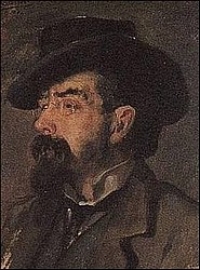
Francisco de Asís Tárrega y Eixea (21 November 1852 – 15 December 1909) was an influential Spanish composer and guitarist of the Romantic period.
Pablo de Sarasate

Pablo Martín Melitón de Sarasate y Navascués (10 March 1844 – 20 September 1908) was a Spanish violinist and composer of the Romantic period.
Edgar Meyer
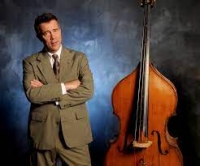
Edgar Meyer is an American bassist and composer. His styles include classical, bluegrass, newgrass, and jazz. He has won five Grammy Awards and been nominated seven times. Meyer is a member of the Telluride Bluegrass Festival's "house band" super group, along with Bush, Fleck, Douglas, Duncan, and Bryan Sutton
Jules Massenet
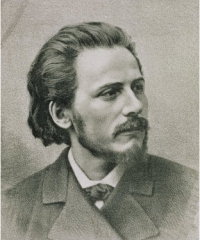
Jules (Émile Frédéric) Massenet (May 12, 1842 – August 13, 1912) was a French composer best known for his operas. His compositions were very popular in the late 19th and early 20th centuries, and he ranks as one of the greatest melodists of his era. Soon after his death, Massenet's style went out of fashion, and many of his operas fell into almost total oblivion. Apart from Manon and Werther, his works were rarely performed. However, since the mid-1970s, many operas of his such as Thaïs and Esclarmonde have undergone periodic revivals.
Henry Purcell

Henry Purcell (pronounced /ˈpɜrsəl/; 10 September 1659 (?) – 21 November 1695), was an English organist and Baroque composer of secular and sacred music. Although Purcell incorporated Italian and French stylistic elements into his compositions, his legacy was a uniquely English form of Baroque music.
Jeno Hubay
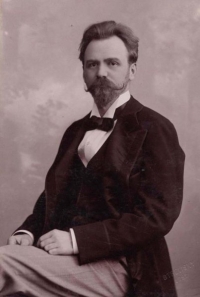
Jenő Hubay, Jenő Hubay von Szalatna, Hungarian: szalatnai Hubay Jenő (Hungarian pronunciation: ; 15 September 1858 – 12 March 1937), also known by his German name Eugen Huber (pronounced ), was a Hungarian violinist, composer and music teacher.
Benjamin Tubb
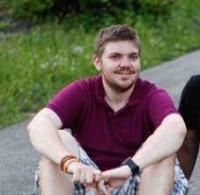
Benjamin Tubb. Born in 1988, Ben has always had an active interest in music, learning piano from an early age, and later the cornet and tenor horn.
Handel

George Frideric Handel (Friday, 23 February 1685 - Saturday, 14 April 1759) was a German-born Baroque composer who is famous for his operas, oratorios and concerti grossi. Born as Georg Friedrich Handel in Halle, he spent most of his adult life in England, becoming a subject of the British crown on 22 January 1727. His most famous works are Messiah, an oratorio set to texts from the King James Bible; Water Music; and Music for the Royal Fireworks. Strongly influenced by the techniques of the great composers of the Italian Baroque and the English composer Henry Purcell, his music was known to many significant composers who came after him, including Haydn, Mozart, and Beethoven.
Handel's compositions include 42 operas; 29 oratorios; more than 120 cantatas, trios and duets; numerous arias; chamber music; a large number of ecumenical pieces; odes and serenatas; and sixteen organ concerti. His most famous work, the Messiah oratorio with its "Hallelujah" chorus, is among the most popular works in choral music and has become a centerpiece of the Christmas season. Also popular are the Opus 3 and 6 Concerti Grossi, as well as "The Cuckoo and the Nightingale", in which birds are heard calling during passages played in different keys representing the vocal ranges of two birds. Also notable are his sixteen keyboard suites, especially The Harmonious Blacksmith.
Handel introduced various previously uncommon musical instruments in his works: the viola d'amore and violetta marina (Orlando), the lute (Ode for St. Cecilia's Day), three trombones (Saul), clarinets or small high cornets (Tamerlano), theorbo, French horn (Water Music), lyrichord, double bassoon, viola da gamba, bell chimes, positive organ, and harp (Giulio Cesare, Alexander's Feast).
Handel's compositions include 42 operas; 29 oratorios; more than 120 cantatas, trios and duets; numerous arias; chamber music; a large number of ecumenical pieces; odes and serenatas; and sixteen organ concerti. His most famous work, the Messiah oratorio with its "Hallelujah" chorus, is among the most popular works in choral music and has become a centerpiece of the Christmas season. Also popular are the Opus 3 and 6 Concerti Grossi, as well as "The Cuckoo and the Nightingale", in which birds are heard calling during passages played in different keys representing the vocal ranges of two birds. Also notable are his sixteen keyboard suites, especially The Harmonious Blacksmith.
Handel introduced various previously uncommon musical instruments in his works: the viola d'amore and violetta marina (Orlando), the lute (Ode for St. Cecilia's Day), three trombones (Saul), clarinets or small high cornets (Tamerlano), theorbo, French horn (Water Music), lyrichord, double bassoon, viola da gamba, bell chimes, positive organ, and harp (Giulio Cesare, Alexander's Feast).
W.A. Mozart

Wolfgang Amadeus Mozart (German: , full baptismal name Johannes Chrysostomus Wolfgangus Theophilus Mozart (27 January 1756 – 5 December 1791), was a prolific and influential composer of the Classical era. He composed over 600 works, many acknowledged as pinnacles of symphonic, concertante, chamber, piano, operatic, and choral music. He is among the most enduringly popular of classical composers.
Mozart showed prodigious ability from his earliest childhood in Salzburg. Already competent on keyboard and violin, he composed from the age of five and performed before European royalty; at 17 he was engaged as a court musician in Salzburg, but grew restless and traveled in search of a better position, always composing abundantly. While visiting Vienna in 1781, he was dismissed from his Salzburg position. He chose to stay in the capital, where he achieved fame but little financial security. During his final years in Vienna, he composed many of his best-known symphonies, concertos, and operas, and the Requiem. The circumstances of his early death have been much mythologized. He was survived by his wife Constanze and two sons.
Mozart learned voraciously from others, and developed a brilliance and maturity of style that encompassed the light and graceful along with the dark and passionate—the whole informed by a vision of humanity "redeemed through art, forgiven, and reconciled with nature and the absolute." His influence on subsequent Western art music is profound. Beethoven wrote his own early compositions in the shadow of Mozart, of whom Joseph Haydn wrote that "posterity will not see such a talent again in 100 years."
Mozart showed prodigious ability from his earliest childhood in Salzburg. Already competent on keyboard and violin, he composed from the age of five and performed before European royalty; at 17 he was engaged as a court musician in Salzburg, but grew restless and traveled in search of a better position, always composing abundantly. While visiting Vienna in 1781, he was dismissed from his Salzburg position. He chose to stay in the capital, where he achieved fame but little financial security. During his final years in Vienna, he composed many of his best-known symphonies, concertos, and operas, and the Requiem. The circumstances of his early death have been much mythologized. He was survived by his wife Constanze and two sons.
Mozart learned voraciously from others, and developed a brilliance and maturity of style that encompassed the light and graceful along with the dark and passionate—the whole informed by a vision of humanity "redeemed through art, forgiven, and reconciled with nature and the absolute." His influence on subsequent Western art music is profound. Beethoven wrote his own early compositions in the shadow of Mozart, of whom Joseph Haydn wrote that "posterity will not see such a talent again in 100 years."
Rolf Lovland
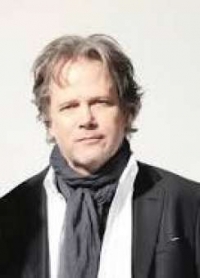
Rolf Undsæt Løvland (born 19 April 1955) is a Norwegian composer, lyricist, arranger, and pianist. Together with Fionnuala Sherry, he formed the Celtic-Nordic group Secret Garden, in which he was the composer, producer, and keyboardist. He began composing at an early age (he formed a band at the age of nine) and grew up studying at the Kristiansand Music Conservatory, later receiving his master's degree from the Norwegian Institute of Music in Oslo. Løvland has won the Eurovision Song Contest twice, composing the songs "La det swinge" in 1985 and "Nocturne" in 1995 alongside Secret Garden, resulting in Norway's first two titles.
Giovanni Bolzoni
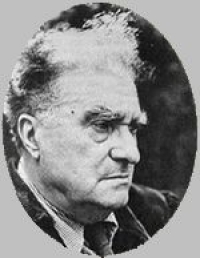
Giovanni Bolzoni (15 May 1841 – 21 February 1919) was an Italian composer and violinist, who is known for his Minuet for String Orchestra.Born in Parma, Bolzoni studied at the Parma Conservatory. After graduating in 1859, he was violinist and part-time conductor with Teatro Comunale di Reggio Emilia and Comunale di Cremona, eventually taking a position in Savona where he also taught violin. After six years he became its concertmaster and conductor. This was followed in 1874 by three years in Perugia as orchestral conductor and theatre director at the Istituto Morlacchi. In 1887, he became director of the Istituto Musicale, concertmaster at the Teatro Regio di Parma and of the Concerti Popolari.
François-Joseph Gossec
François-Joseph Gossec was a French composer of operas, string quartets, symphonies, and choral works
He was born in 1734 as the son of a Belgian farmer and immigrated to France with his extraordinary musical talent.
Although it remains among the forgotten nowadays, its reputation spread beyond the French border. Not to mention that Mozart felt the need to visit him. has a wonderful requiem'i. dies irae reminiscent of a strange anthem and also especially angry confutatis ini mozart requiem lovers should certainly not listen to.
He was born in 1734 as the son of a Belgian farmer and immigrated to France with his extraordinary musical talent.
Although it remains among the forgotten nowadays, its reputation spread beyond the French border. Not to mention that Mozart felt the need to visit him. has a wonderful requiem'i. dies irae reminiscent of a strange anthem and also especially angry confutatis ini mozart requiem lovers should certainly not listen to.
Mykola Leontovych
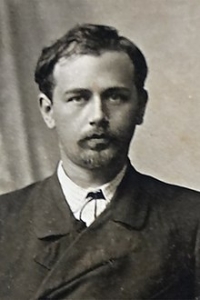
Mykola Dmytrovych Leontovych (Ukrainian: Микола Дмитрович Леонтович; sometimes spelt Leontovich; December 13 1877 – 23 January 1921) was a Ukrainian composer, choral conductor, and teacher of international renown. His music was inspired by Mykola Lysenko and the Ukrainian National Music School. Leontovych specialised in a cappella choral music, ranging from original compositions, to church music, to elaborate arrangements of folk music.
Itzhak Perlman
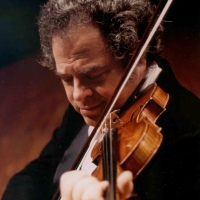
Itzhak Perlman (Hebrew: יצחק פרלמן; born August 31, 1945) is an Israeli American violin virtuoso, conductor, and master-instructor. He is widely considered as one of the preeminent violin virtuosi of the 20th century.
He made his debut at Carnegie Hall in 1963 and won the prestigious Leventritt Competition in 1964. Soon afterward he began to tour extensively. In addition to an extensive recording career, he has made occasional guest appearances on American television, starting in the 1970s on shows such as The Tonight Show and Sesame Street, as well as playing at a number of functions at the White House.
Although he has never been billed or marketed as a singer, he sang the role of "Un carceriere" ("a jailer") on a 1981 EMI recording of Puccini's Tosca which featured Renata Scotto, Plácido Domingo, and Renato Bruson, with James Levine conducting. He had earlier sung the role in an excerpt from the opera on a 1980 Pension Fund Benefit Concert telecast as part of the Live from Lincoln Center series, with Luciano Pavarotti as Cavaradossi, and Zubin Mehta conducting the New York Philharmonic. Perlman is a basso.
In 1987, he joined the Israel Philharmonic Orchestra for their concerts in Warsaw and Budapest, as well as other Eastern bloc countries. He toured with the IPO in the spring of 1990 for their first-ever performance in the Soviet Union, with concerts in Moscow and Leningrad, and toured with the IPO again in 1994, performing in China and India.
While primarily a solo artist, Perlman has performed with a number of other notable musicians, including Yo-Yo Ma, Jessye Norman, Isaac Stern, and Yuri Temirkanov at the 150th anniversary celebration of Tchaikovsky in Leningrad in December 1990. He has also performed (and recorded) with good friend and fellow Israeli violinist Pinchas Zukerman on numerous occasions over the years.
As well as playing and recording the classical music for which he is best known, Perlman has also played jazz, including an album made with jazz pianist Oscar Peterson, and klezmer. Perlman has been a soloist for a number of movie scores, notably the score of the 1993 film Schindler's List by John Williams, which subsequently won an Academy Award for best score. More recently, he was the violin soloist for the 2005 film Memoirs of a Geisha, along with cellist Yo-Yo Ma. Perlman played selections from the musical scores of the movies nominated for "Best Original Score" at the 73rd Academy Awards with Yo-Yo Ma, and at the 78th Academy Awards.
He made his debut at Carnegie Hall in 1963 and won the prestigious Leventritt Competition in 1964. Soon afterward he began to tour extensively. In addition to an extensive recording career, he has made occasional guest appearances on American television, starting in the 1970s on shows such as The Tonight Show and Sesame Street, as well as playing at a number of functions at the White House.
Although he has never been billed or marketed as a singer, he sang the role of "Un carceriere" ("a jailer") on a 1981 EMI recording of Puccini's Tosca which featured Renata Scotto, Plácido Domingo, and Renato Bruson, with James Levine conducting. He had earlier sung the role in an excerpt from the opera on a 1980 Pension Fund Benefit Concert telecast as part of the Live from Lincoln Center series, with Luciano Pavarotti as Cavaradossi, and Zubin Mehta conducting the New York Philharmonic. Perlman is a basso.
In 1987, he joined the Israel Philharmonic Orchestra for their concerts in Warsaw and Budapest, as well as other Eastern bloc countries. He toured with the IPO in the spring of 1990 for their first-ever performance in the Soviet Union, with concerts in Moscow and Leningrad, and toured with the IPO again in 1994, performing in China and India.
While primarily a solo artist, Perlman has performed with a number of other notable musicians, including Yo-Yo Ma, Jessye Norman, Isaac Stern, and Yuri Temirkanov at the 150th anniversary celebration of Tchaikovsky in Leningrad in December 1990. He has also performed (and recorded) with good friend and fellow Israeli violinist Pinchas Zukerman on numerous occasions over the years.
As well as playing and recording the classical music for which he is best known, Perlman has also played jazz, including an album made with jazz pianist Oscar Peterson, and klezmer. Perlman has been a soloist for a number of movie scores, notably the score of the 1993 film Schindler's List by John Williams, which subsequently won an Academy Award for best score. More recently, he was the violin soloist for the 2005 film Memoirs of a Geisha, along with cellist Yo-Yo Ma. Perlman played selections from the musical scores of the movies nominated for "Best Original Score" at the 73rd Academy Awards with Yo-Yo Ma, and at the 78th Academy Awards.
Gustav Mahler

Gustav Mahler was an Austrian late-Romantic composer, and one of the leading conductors of his generation. As a composer he acted as a bridge between the 19th century Austro-German tradition and the modernism of the early 20th century.
Astor Piazzola

Astor Pantaleón Piazzolla (Spanish pronunciation: , Italian pronunciation: ; March 11, 1921 – July 4, 1992) was an Argentine tango composer, bandoneon player, and arranger. His oeuvre revolutionized the traditional tango into a new style termed nuevo tango, incorporating elements from jazz and classical music. A virtuoso bandoneonist, he regularly performed his own compositions with a variety of ensembles.
In 1992, American music critic Stephen Holden described Piazzolla as "the world's foremost composer of tango music"
In 1992, American music critic Stephen Holden described Piazzolla as "the world's foremost composer of tango music"
Vivaldi

Antonio Lucio Vivaldi (March 4, 1678 â July 28, 1741), nicknamed il Prete Rosso ("The Red Priest"), was a Venetian priest and Baroque music composer, as well as a famous virtuoso violinist; he was born and raised in the Republic of Venice. The Four Seasons, a series of four violin concerti, is his best-known work and a highly popular Baroque piece.
Many of Vivaldi's compositions reflect a flamboyant, almost playful, exuberance. Most of Vivaldi's repertoire was rediscovered only in the first half of the 20th century in Turin and Genoa and was published in the second half. Vivaldi's music is innovative, breaking a consolidated tradition in schemes; he gave brightness to the formal and the rhythmic structure of the concerto, repeatedly looking for harmonic contrasts and innovative melodies and themes. Moreover, Vivaldi was able to compose nonacademic music, particularly meant to be appreciated by the wide public and not only by an intellectual minority. The joyful appearance of his music reveals in this regard a transmissible joy of composing; these are among the causes of the vast popularity of his music. This popularity soon made him famous in other countries such as France which was, at the time, very independent concerning its musical taste.
Vivaldi is considered one of the composers who brought Baroque music (with its typical contrast among heavy sonorities) to evolve into a classical style. Johann Sebastian Bach was deeply influenced by Vivaldi's concertos and arias (recalled in his Johannes Passion, Matthäuspassion, and cantatas). Bach transcribed a number of Vivaldi's concerti for solo keyboard, along with a number for orchestra, including the famous Concerto for Four Violins and Violoncello, Strings and Continuo (RV 580).
Many of Vivaldi's compositions reflect a flamboyant, almost playful, exuberance. Most of Vivaldi's repertoire was rediscovered only in the first half of the 20th century in Turin and Genoa and was published in the second half. Vivaldi's music is innovative, breaking a consolidated tradition in schemes; he gave brightness to the formal and the rhythmic structure of the concerto, repeatedly looking for harmonic contrasts and innovative melodies and themes. Moreover, Vivaldi was able to compose nonacademic music, particularly meant to be appreciated by the wide public and not only by an intellectual minority. The joyful appearance of his music reveals in this regard a transmissible joy of composing; these are among the causes of the vast popularity of his music. This popularity soon made him famous in other countries such as France which was, at the time, very independent concerning its musical taste.
Vivaldi is considered one of the composers who brought Baroque music (with its typical contrast among heavy sonorities) to evolve into a classical style. Johann Sebastian Bach was deeply influenced by Vivaldi's concertos and arias (recalled in his Johannes Passion, Matthäuspassion, and cantatas). Bach transcribed a number of Vivaldi's concerti for solo keyboard, along with a number for orchestra, including the famous Concerto for Four Violins and Violoncello, Strings and Continuo (RV 580).
The Corrs

The Corrs are a Celtic folk rock group from Dundalk, County Louth, Ireland. The group consists of the Corr siblings: Andrea (vocals, tin whistle); Sharon (violin, vocals); Caroline (drums, percussion, bodhrán, vocals); and Jim (guitar, keyboards, vocals).
The Corrs came to international prominence with their performance at the 1996 Summer Olympics in Atlanta, Georgia. Since then, they have released five studio albums and numerous singles, which have reached platinum in many countries. Talk on Corners, their most successful album to date, reached multi-platinum status in Australia and the UK.
The Corrs have been actively involved in philanthropic activities. They have performed in numerous charity concerts such as the Prince's Trust in 2004 and Live 8 alongside Bono in 2005. The same year, they were awarded honorary MBEs for their contributions to music and charity. The Corrs are on hiatus because Sharon, Jim, and Caroline are raising families, while Andrea is pursuing a solo career.
The Corrs came to international prominence with their performance at the 1996 Summer Olympics in Atlanta, Georgia. Since then, they have released five studio albums and numerous singles, which have reached platinum in many countries. Talk on Corners, their most successful album to date, reached multi-platinum status in Australia and the UK.
The Corrs have been actively involved in philanthropic activities. They have performed in numerous charity concerts such as the Prince's Trust in 2004 and Live 8 alongside Bono in 2005. The same year, they were awarded honorary MBEs for their contributions to music and charity. The Corrs are on hiatus because Sharon, Jim, and Caroline are raising families, while Andrea is pursuing a solo career.
Johann Christian Bach
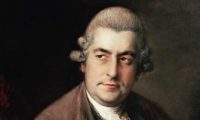
Johann Christian Bach was a German composer of the Classical era, the eighteenth child of Johann Sebastian Bach, and the youngest of his eleven sons. After living in Italy for several years, Bach moved to London in 1762, where he became known as "the London Bach".
Henryk Wieniawski

Henryk Wieniawski (10 July 1835 – 31 March 1880) was a Polish violinist and composer. He was considered a violinist of genius and wrote some of the most important works in the violin repertoire, including two extremely difficult violin concertos, the second of which (in D minor, 1862) is more often performed than the first (in F♯ minor, 1853). His "L'Ecole Moderne, 10 Etudes-Caprices" is a very well known and required work for aspiring violinists. His Scherzo-Tarantelle, Op. 16 and Légende, Op. 17 are also frequently performed works. He also wrote two popular mazurkas for solo violin and piano accompaniment (the second one, Obertas, in G Major), using techniques such as left-hand pizzicato, harmonics, large leaps, and many double stops. Wieniawski has been given a number of posthumous honors. His portrait appeared on a postage stamp of Poland in 1952 and again in 1957. A 100 Złoty coin was issued in 1979 bearing his image.
What is sometimes called the "Russian bow grip" ought to be called the "Wieniawski bow grip": Wieniawski taught his students his own kind of very stiff bowing that allowed him to play a "devil's staccato" with ease. This "devil's staccato" was easily used to discipline students.
What is sometimes called the "Russian bow grip" ought to be called the "Wieniawski bow grip": Wieniawski taught his students his own kind of very stiff bowing that allowed him to play a "devil's staccato" with ease. This "devil's staccato" was easily used to discipline students.
Beauty and the Beast
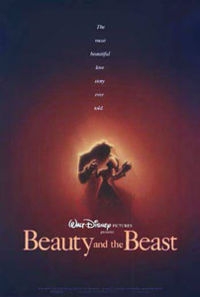
Beauty and the Beast is a 1991 animated American family film. It is the thirtieth animated feature produced by Walt Disney Feature Animation. The film received its premiere at the El Capitan Theatre in Hollywood on November 13, 1991. This film, one of the best known of the Disney studio's films, is based on the well-known fairy tale Beauty and the Beast, about a beautiful woman kept in a castle by a horrific monster. It is the first and only full-length animated feature film to ever be nominated for an Academy Award for Best Picture (it lost to The Silence of the Lambs). Heightening the level of performance in the era known as the Disney Renaissance (1989-1999, beginning with The Little Mermaid and ending with Tarzan ), many animated films following its release have been influenced by its blending of traditional animation and computer generated imagery.
Beauty and the Beast ranked 7th on the American Film Institutes's list of best animated films, #22 on the Institutes's list of best musicals and #34 on its list of the best romantic American movies. On the list of the greatest songs from American movies, Beauty and the Beast ranked #62. The film was adapted into a Broadway musical of the same name, which ran from 1994 to 2007.
In 2002, Beauty and the Beast was added to the United States National Film Registry as being deemed "culturally, historically, or aesthetically significant." In January of the same year, the film was reissued in IMAX format in a special edition edit including a new musical sequence. A two-disc Platinum Edition DVD release followed in October.
Beauty and the Beast ranked 7th on the American Film Institutes's list of best animated films, #22 on the Institutes's list of best musicals and #34 on its list of the best romantic American movies. On the list of the greatest songs from American movies, Beauty and the Beast ranked #62. The film was adapted into a Broadway musical of the same name, which ran from 1994 to 2007.
In 2002, Beauty and the Beast was added to the United States National Film Registry as being deemed "culturally, historically, or aesthetically significant." In January of the same year, the film was reissued in IMAX format in a special edition edit including a new musical sequence. A two-disc Platinum Edition DVD release followed in October.
Georges Bizet

Georges Bizet (25 October 1838 – 3 June 1875) was a French composer and pianist of the Romantic era. He is best known for the opera Carmen.
Bizet was born at 26 rue de la Tour d'Auvergne in the 9th arrondissement of Paris in 1838. He was registered with the legal name Alexandre César Léopold Bizet, but he was baptised on 16 March 1840 with the first name Georges, and he was always known thereafter as Georges Bizet. His father Adolphe Armand Bizet (1810-86) was an amateur singer and composer, and his mother, Aimée Léopoldine Joséphine née Delsarte (1814-61), was the sister of the famous singing teacher François Delsarte.
He entered the Paris Conservatory of Music on 9 October 1848, a fortnight before his tenth birthday. His teachers there were Pierre Zimmermann (fugue and counterpoint; often assisted by his son-in-law Charles Gounod), Antoine François Marmontel (piano), François Benoist (organ) and, on Zimmermann's death, Fromental Halévy, whose daughter he himself later married. He won first prizes for organ and fugue in 1855 and completed his earliest compositions.
His first symphony, the Symphony in C, was written in November 1855, when he was seventeen, evidently as a student assignment. It was unknown to the world until 1933, when it was discovered in the archives of the Paris Conservatory library. Upon its first performance in 1935, it was immediately hailed as a junior masterwork and a welcome addition to the early Romantic period repertoire. The symphony bears a stylistic resemblance to the first symphony of Gounod, first played earlier in the same year, and which Bizet had arranged for two pianos although present-day listeners may discern a similarity to music of Franz Schubert, whose work was little known in France at the time the symphony was written.
In 1857, a setting of the one-act operetta Le docteur Miracle won him a share in a prize offered by Jacques Offenbach. He also won the music composition scholarship of the Prix de Rome, the conditions of which required him to study in Rome for three years. There, his talent developed as he wrote such works as the opera buffa Don Procopio (1858-59). There he also composed his only major sacred work, Te Deum (1858), which he submitted to the Prix Rodrigues competition, a contest for Prix de Rome winners only. Bizet failed to win the Prix Rodrigues, and the Te Deum score remained unpublished until 1971. He made two attempts to write another symphony in 1859, but destroyed the manuscripts in December of that year. Apart from this period in Rome, Bizet lived in the Paris area all his life.
Shortly after leaving Rome in July 1860, but while still touring in Italy, he had the idea of writing a symphony in which each of the four movements would be a musical evocation of a different Italian city – Rome, Venice, Florence and Naples. On hearing of his mother's serious illness he cut short his Italian travels and returned to Paris in September 1860; she died a year later. The Scherzo of the symphony was completed by November 1861, but it was not until 1866 that the first version of the whole symphony was written. He subjected it to a number of revisions through to 1871, but died before ever producing what he considered the definitive version. For this reason, the work is sometimes described as "unfinished", but this is an inaccurate description as it was fully scored. It was published in 1880 as the Roma Symphony.
Bizet was born at 26 rue de la Tour d'Auvergne in the 9th arrondissement of Paris in 1838. He was registered with the legal name Alexandre César Léopold Bizet, but he was baptised on 16 March 1840 with the first name Georges, and he was always known thereafter as Georges Bizet. His father Adolphe Armand Bizet (1810-86) was an amateur singer and composer, and his mother, Aimée Léopoldine Joséphine née Delsarte (1814-61), was the sister of the famous singing teacher François Delsarte.
He entered the Paris Conservatory of Music on 9 October 1848, a fortnight before his tenth birthday. His teachers there were Pierre Zimmermann (fugue and counterpoint; often assisted by his son-in-law Charles Gounod), Antoine François Marmontel (piano), François Benoist (organ) and, on Zimmermann's death, Fromental Halévy, whose daughter he himself later married. He won first prizes for organ and fugue in 1855 and completed his earliest compositions.
His first symphony, the Symphony in C, was written in November 1855, when he was seventeen, evidently as a student assignment. It was unknown to the world until 1933, when it was discovered in the archives of the Paris Conservatory library. Upon its first performance in 1935, it was immediately hailed as a junior masterwork and a welcome addition to the early Romantic period repertoire. The symphony bears a stylistic resemblance to the first symphony of Gounod, first played earlier in the same year, and which Bizet had arranged for two pianos although present-day listeners may discern a similarity to music of Franz Schubert, whose work was little known in France at the time the symphony was written.
In 1857, a setting of the one-act operetta Le docteur Miracle won him a share in a prize offered by Jacques Offenbach. He also won the music composition scholarship of the Prix de Rome, the conditions of which required him to study in Rome for three years. There, his talent developed as he wrote such works as the opera buffa Don Procopio (1858-59). There he also composed his only major sacred work, Te Deum (1858), which he submitted to the Prix Rodrigues competition, a contest for Prix de Rome winners only. Bizet failed to win the Prix Rodrigues, and the Te Deum score remained unpublished until 1971. He made two attempts to write another symphony in 1859, but destroyed the manuscripts in December of that year. Apart from this period in Rome, Bizet lived in the Paris area all his life.
Shortly after leaving Rome in July 1860, but while still touring in Italy, he had the idea of writing a symphony in which each of the four movements would be a musical evocation of a different Italian city – Rome, Venice, Florence and Naples. On hearing of his mother's serious illness he cut short his Italian travels and returned to Paris in September 1860; she died a year later. The Scherzo of the symphony was completed by November 1861, but it was not until 1866 that the first version of the whole symphony was written. He subjected it to a number of revisions through to 1871, but died before ever producing what he considered the definitive version. For this reason, the work is sometimes described as "unfinished", but this is an inaccurate description as it was fully scored. It was published in 1880 as the Roma Symphony.
Frederick William Nicholls Crouch
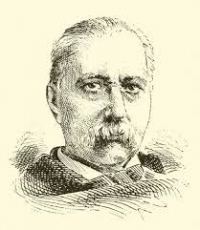
Frederick William Nicholls Crouch (30 July 1808 – 18 August 1896) was an English composer and cellist.
Igor Stravinsky

Igor Fyodorovich Stravinsky (17 June 1882 – 6 April 1971) was a Russian-born, naturalised French, later naturalised American composer, pianist, and conductor.
He is widely acknowledged as one of the most important and influential composers of 20th century music. He was a quintessentially cosmopolitan Russian who was named by Time magazine as one of the 100 most influential people of the century. He became a naturalised French citizen in 1934 and a naturalized US citizen in 1945. In addition to the recognition he received for his compositions, he also achieved fame as a pianist and a conductor, often at the premieres of his works.
Stravinsky's compositional career was notable for its stylistic diversity. He first achieved international fame with three ballets commissioned by the impresario Sergei Diaghilev and performed by Diaghilev's Ballets Russes (Russian Ballets): The Firebird (1910), Petrushka (1911/1947), and The Rite of Spring (1913). The Rite, whose premiere provoked a riot, transformed the way in which subsequent composers thought about rhythmic structure, and was largely responsible for Stravinsky's enduring reputation as a musical revolutionary, pushing the boundaries of musical design.
After this first Russian phase Stravinsky turned to neoclassicism in the 1920s. The works from this period tended to make use of traditional musical forms (concerto grosso, fugue, symphony), frequently concealed a vein of intense emotion beneath a surface appearance of detachment or austerity, and often paid tribute to the music of earlier masters, for example J.S. Bach and Tchaikovsky.
In the 1950s he adopted serial procedures, using the new techniques over his last twenty years. Stravinsky's compositions of this period share traits with examples of his earlier output: rhythmic energy, the construction of extended melodic ideas out of a few two- or three-note cells, and clarity of form, of instrumentation, and of utterance.
He also published a number of books throughout his career, almost always with the aid of a collaborator, sometimes uncredited. In his 1936 autobiography, Chronicles of My Life, written with the help of Walter Nouvel, Stravinsky included his well-known statement that "music is, by its very nature, essentially powerless to express anything at all." With Alexis Roland-Manuel and Pierre Souvtchinsky he wrote his 1939–40 Harvard University Charles Eliot Norton Lectures, which were delivered in French and later collected under the title Poétique musicale in 1942 (translated in 1947 as Poetics of Music). Several interviews in which the composer spoke to Robert Craft were published as Conversations with Igor Stravinsky. They collaborated on five further volumes over the following decade.
He is widely acknowledged as one of the most important and influential composers of 20th century music. He was a quintessentially cosmopolitan Russian who was named by Time magazine as one of the 100 most influential people of the century. He became a naturalised French citizen in 1934 and a naturalized US citizen in 1945. In addition to the recognition he received for his compositions, he also achieved fame as a pianist and a conductor, often at the premieres of his works.
Stravinsky's compositional career was notable for its stylistic diversity. He first achieved international fame with three ballets commissioned by the impresario Sergei Diaghilev and performed by Diaghilev's Ballets Russes (Russian Ballets): The Firebird (1910), Petrushka (1911/1947), and The Rite of Spring (1913). The Rite, whose premiere provoked a riot, transformed the way in which subsequent composers thought about rhythmic structure, and was largely responsible for Stravinsky's enduring reputation as a musical revolutionary, pushing the boundaries of musical design.
After this first Russian phase Stravinsky turned to neoclassicism in the 1920s. The works from this period tended to make use of traditional musical forms (concerto grosso, fugue, symphony), frequently concealed a vein of intense emotion beneath a surface appearance of detachment or austerity, and often paid tribute to the music of earlier masters, for example J.S. Bach and Tchaikovsky.
In the 1950s he adopted serial procedures, using the new techniques over his last twenty years. Stravinsky's compositions of this period share traits with examples of his earlier output: rhythmic energy, the construction of extended melodic ideas out of a few two- or three-note cells, and clarity of form, of instrumentation, and of utterance.
He also published a number of books throughout his career, almost always with the aid of a collaborator, sometimes uncredited. In his 1936 autobiography, Chronicles of My Life, written with the help of Walter Nouvel, Stravinsky included his well-known statement that "music is, by its very nature, essentially powerless to express anything at all." With Alexis Roland-Manuel and Pierre Souvtchinsky he wrote his 1939–40 Harvard University Charles Eliot Norton Lectures, which were delivered in French and later collected under the title Poétique musicale in 1942 (translated in 1947 as Poetics of Music). Several interviews in which the composer spoke to Robert Craft were published as Conversations with Igor Stravinsky. They collaborated on five further volumes over the following decade.
Nine Inch Nails

Nine Inch Nails are an American industrial rock band, founded in 1988 by Trent Reznor in Cleveland, Ohio. Reznor is the main producer, singer, songwriter and instrumentalist, but NIN are still considered a band. NIN's music straddles a wide range of genres, while retaining a characteristic sound using electronic instruments and processing. After recording a new album, Reznor usually assembles a live band to perform with him. The touring band features a revolving lineup that often rearranges songs to fit a live setting. On stage, NIN often employs visual elements to accompany performances, which frequently include light shows.
Underground music audiences warmly received Nine Inch Nails in their early years. Reznor produced several highly influential records in the 1990s that achieved widespread popularity; many Nine Inch Nails songs became radio hits, two NIN recordings won Grammy Awards, and the band have sold over 20 million albums worldwide, with 10.5 million sales certified in the US alone. In 1997, Reznor appeared in Time magazine's list of the year's most influential people, and Spin magazine described him as "the most vital artist in music." In 2004, Rolling Stone placed Nine Inch Nails at 94 on its list of the 100 greatest artists of all time. Despite this acclaim, the band have had several feuds with the corporate side of the recording industry. In 2007, these corporate entanglements resulted in Reznor announcing that Nine Inch Nails would split from its label and release future material independently.
Since 1989, Nine Inch Nails have made eight major studio releases. The most recent releases, Ghosts I–IV and The Slip, both released in 2008, were released under Creative Commons licenses. Both were initially released digitally, with physical releases coming later. The digital release of The Slip was made available completely free of charge. NIN have been nominated for twelve Grammy Awards and won twice for the songs "Wish" and "Happiness in Slavery", in 1992 and 1995 respectively.
Underground music audiences warmly received Nine Inch Nails in their early years. Reznor produced several highly influential records in the 1990s that achieved widespread popularity; many Nine Inch Nails songs became radio hits, two NIN recordings won Grammy Awards, and the band have sold over 20 million albums worldwide, with 10.5 million sales certified in the US alone. In 1997, Reznor appeared in Time magazine's list of the year's most influential people, and Spin magazine described him as "the most vital artist in music." In 2004, Rolling Stone placed Nine Inch Nails at 94 on its list of the 100 greatest artists of all time. Despite this acclaim, the band have had several feuds with the corporate side of the recording industry. In 2007, these corporate entanglements resulted in Reznor announcing that Nine Inch Nails would split from its label and release future material independently.
Since 1989, Nine Inch Nails have made eight major studio releases. The most recent releases, Ghosts I–IV and The Slip, both released in 2008, were released under Creative Commons licenses. Both were initially released digitally, with physical releases coming later. The digital release of The Slip was made available completely free of charge. NIN have been nominated for twelve Grammy Awards and won twice for the songs "Wish" and "Happiness in Slavery", in 1992 and 1995 respectively.
 Sheet Music Drive is a web site for those who wants to access popular sheet music easily,
letting them download the sheet music for free for trial purposes.
It's completely free to download and try the listed sheet music, but you have to delete the files after 24 hours of trial period.
Don't forget, if you like the piece of music you have just learned playing,
treat the artist with respect, and go buy the original sheet music.
Sheet Music Drive is a web site for those who wants to access popular sheet music easily,
letting them download the sheet music for free for trial purposes.
It's completely free to download and try the listed sheet music, but you have to delete the files after 24 hours of trial period.
Don't forget, if you like the piece of music you have just learned playing,
treat the artist with respect, and go buy the original sheet music.
